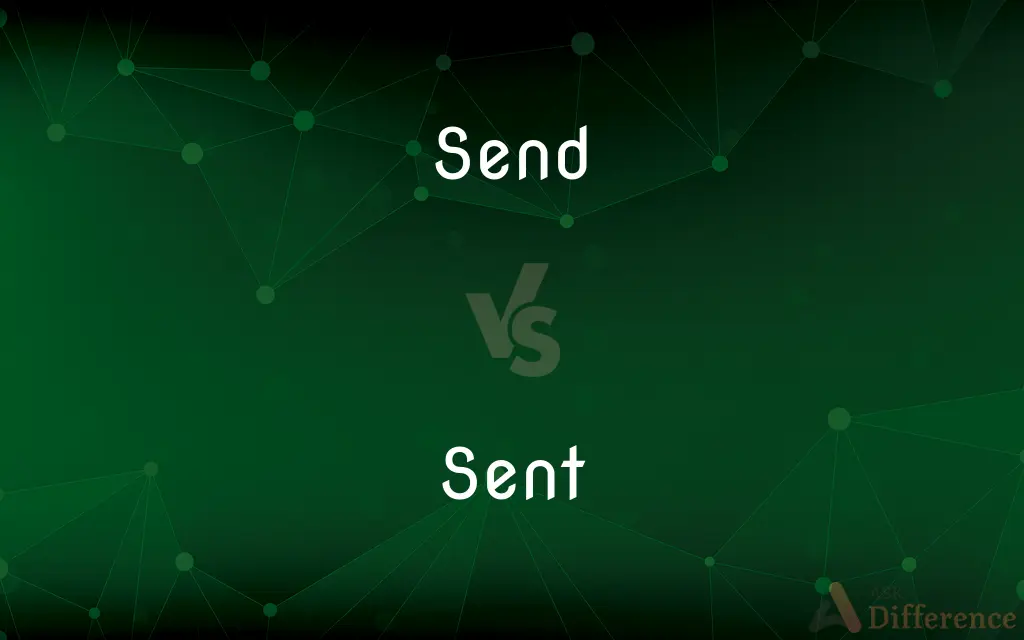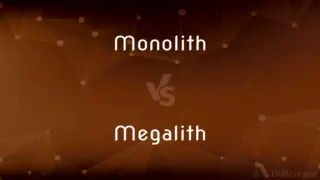Send vs. Sent — What's the Difference?
By Tayyaba Rehman — Updated on August 22, 2023
"Send" is the present tense form of the verb, indicating an action taking place now, while "sent" is the past tense and past participle form, indicating an action that has already taken place.

Difference Between Send and Sent
Table of Contents
ADVERTISEMENT
Key Differences
"Send" is in the present tense. It describes an action that is currently happening or a habitual action. For instance, "I send emails daily" means that the act of sending emails is a regular occurrence. On the other hand, "sent" signifies that the action was completed in the past. Thus, "I sent the email yesterday" indicates that the task was done a day ago.
"Send" can be used as a command or an imperative. Telling someone to "Send the documents" means you're directing them to perform the action now. Contrarily, "sent" being in the past tense can't be used as a command. Instead, it reflects on an action that was done, like in the statement "She sent the documents last week."
When "send" is used in future tense constructions, it represents an intention or plan, as in "I will send the package tomorrow." In contrast, "sent" will always point back to a time before the present, as in "By the time you read this, I will have sent the package."
Both "send" and "sent" can be used in passive constructions. "The letter is sent by her" means someone else does the action on behalf of her, using the past participle form "sent". Alternatively, "The letter is to be sent by her" suggests a future action using the base form "send."
While both "send" and "sent" revolve around the act of dispatching or conveying, "send" is about the present or future, and "sent" firmly remains in the past.
ADVERTISEMENT
Comparison Chart
Tense
Present
Past
Usage in Time
Current or Future
Completed in the Past
As a Command
Yes (e.g., "Send the letter!")
No
In Passive Voice
"to be sent"
"was/were sent"
Example
"I send emails."
"I sent an email yesterday."
Compare with Definitions
Send
To dispatch or convey from one place to another.
Please send the package to my office.
Sent
Dispatched or conveyed from one location to another.
The letter was sent last week.
Send
To cause to go or be taken.
The coach will send the player to the field.
Sent
Sent is a former municipality in the district of Inn in the Swiss Canton of Graubünden. On 1 January 2015 the former municipalities of Ardez, Guarda, Tarasp, Ftan and Sent merged into the municipality of Scuol.
Send
To cause to be conveyed by an intermediary to a destination
Send goods by plane.
Sent
Caused someone to go or be taken somewhere.
He sent his son to college.
Send
To transmit electronically.
I'll send the photos via email.
Sent
Transmitted or forwarded electronically.
The document was sent to her inbox.
Send
To require or enable to go
Sent her children to college.
Sent
Past tense and past participle of send1.
Send
To dispatch an agent or messenger to convey a message, or to do an errand.
See ye how this son of a murderer hath sent to take away my head?
Sent
Simple past tense and past participle of send
Send
Broadcast over the airwaves, as in radio or television;
We cannot air this X-rated song
Sent
Obsolete form of scent
Send
To give off (heat, for example); emit or issue
A stove that sends forth great warmth.
Sent
Caused to enter a specific state.
The joke sent everyone into fits of laughter.
Send
To utter or otherwise emit (sound)
Sent forth a cry of pain.
Sent
Released or emitted from a source.
The flowers sent a pleasant aroma.
Send
To hit so as to direct or propel with force; drive
The batter sent the ball to left field. The slap on my back sent me staggering.
Sent
Caused or enabled to go or be conveyed or transmitted
Send
To cause to take place or occur
We will meet whatever vicissitudes fate may send.
Sent
(until the introduction of the euro in 2011) a monetary unit of Estonia, equal to one hundredth of a kroon.
Send
To put or drive into a given state or condition
Horrifying news that sent them into a panic.
Sent
100 senti equal 1 kroon
Send
(Slang) To transport with delight; carry away
That music really sends me.
Sent
A subdivision of currency, equal to one hundredth of an Estonian kroon.
Send
To dispatch someone to do an errand or convey a message
Let's send out for hamburgers.
Send
To dispatch a request or order, especially by mail
Send away for a new catalogue.
Send
To transmit a message or messages
The radio operator was still sending when the ship went down.
Send
Variant of scend.
Send
To make something (such as an object or message) go from one place to another (or to someone).
Every day at two o'clock, he sends his secretary out to buy him a coffee.
She sends me a letter every month.
Send
To excite, delight, or thrill (someone).
Send
(transitive) To bring to a certain condition.
Send
To dispatch an agent or messenger to convey a message or do an errand.
Seeing how ill she was, we sent for a doctor at once.
Send
(transitive) To cause to be or to happen; to bring, bring about; (archaic) to visit: (Referring to blessing or reward) To bestow; to grant. (Referring to curse or punishment) To inflict. Sometimes followed by a dependent proposition.
Send
To pitch.
Send
To make a successful ascent of a sport climbing route.
She finally sent the 12a after hours of failed attempts.
Send
To care.
Send
(telecommunications) An operation in which data is transmitted.
Send
An icon (usually on a computer screen and labeled with the word "Send") on which one clicks (with a mouse or its equivalent) or taps to transmit an email or other electronic message.
Good thing I didn't hit send on that resume; I just noticed a bad typo.
Send
(nautical) scend
Send
(Scotland) A messenger, especially one sent to fetch the bride.
Send
A callout or diss usually aimed at a specific person, often in the form of a diss track.
Send
(climbing) A successful ascent of a sport climbing route.
Send
To cause to go in any manner; to dispatch; to commission or direct to go; as, to send a messenger.
I have not sent these prophets, yet they ran.
I proceeded forth and came from God; neither came I of myself, but he sent me.
Servants, sent on messages, stay out somewhat longer than the message requires.
Send
To give motion to; to cause to be borne or carried; to procure the going, transmission, or delivery of; as, to send a message.
He . . . sent letters by posts on horseback.
O send out thy light an thy truth; let them lead me.
Send
To emit; to impel; to cast; to throw; to hurl; as, to send a ball, an arrow, or the like.
Send
To cause to be or to happen; to bestow; to inflict; to grant; - sometimes followed by a dependent proposition.
The Lord shall send upon thee cursing, vexation, and rebuke.
And sendeth rain on the just and on the unjust.
God send your mission may bring back peace.
Send
To pitch; as, the ship sends forward so violently as to endanger her masts.
Send
The impulse of a wave by which a vessel is carried bodily.
Send
Cause to go somewhere;
The explosion sent the car flying in the air
She sent her children to camp
He directed all his energies into his dissertation
Send
To cause or order to be taken, directed, or transmitted to another place;
He had sent the dispatches downtown to the proper people and had slept
Send
Cause to be directed or transmitted to another place;
Send me your latest results
I'll mail you the paper when it's written
Send
Transport commercially
Send
Assign to a station
Send
Transfer;
The spy sent the classified information off to Russia
Send
Cause to be admitted; of persons to an institution;
After the second episode, she had to be committed
He was committed to prison
Send
To cause to enter into a particular state or condition.
His performance sent the crowd into applause.
Send
To emit or release.
Flowers send a sweet fragrance.
Send
To dispatch, as by a communications medium
Send a message by radio.
Send
To direct to go on a mission
Sent troops into the Middle East.
Send
To direct (a person) to a source of information; refer
Sent the student to the reference section of the library.
Common Curiosities
How is "sent" used in passive voice?
"Sent" is used as a past participle in passive constructions like "The letter was sent."
Is "send" used to indicate future actions?
While "send" itself is present tense, it can be used in future tense constructions, such as "I will send the mail tomorrow."
What does "sent" indicate in terms of time?
"Sent" indicates an action that has taken place in the past.
What's a synonym for "send"?
A synonym for "send" could be "dispatch" or "transmit," depending on the context.
Can "sent" be used to describe an email?
Yes, "sent" can describe emails that have been dispatched, as in "The email was sent."
Can "send" and "sent" both be used in passive voice?
Yes, both can be used in passive voice, with "send" in structures like "to be sent" and "sent" in structures like "was sent."
How do I use "sent" in a sentence?
"Sent" can be used to denote a past action like, "I sent the package yesterday."
What tense is the word "send"?
"Send" is in the present tense, denoting a current or habitual action.
Can "send" be used as a command?
Yes, "send" can be used as an imperative or command, such as "Send the letter now."
What part of speech are "send" and "sent"?
Both "send" and "sent" are verbs; "send" is the base form, and "sent" is the past tense and past participle form.
Share Your Discovery

Previous Comparison
Monolith vs. Megalith
Next Comparison
Leukocyte vs. LymphocyteAuthor Spotlight
Written by
Tayyaba RehmanTayyaba Rehman is a distinguished writer, currently serving as a primary contributor to askdifference.com. As a researcher in semantics and etymology, Tayyaba's passion for the complexity of languages and their distinctions has found a perfect home on the platform. Tayyaba delves into the intricacies of language, distinguishing between commonly confused words and phrases, thereby providing clarity for readers worldwide.














































